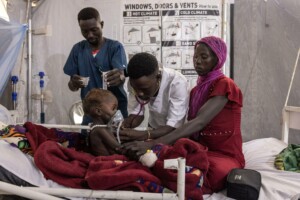Sudan OCHA bulletin 29: Measures to prevent cholera transmission from South Sudan
As South Sudanese refugees continue to arrive in Sudan, UNHCR and the Sudanese Ministry of Health are preparing a prevention and response plan to the increasing number of cholera cases reported in South Sudan. In South Kordofan, at least 600 people have been affected by heavy rainfall.
As South Sudanese refugees continue to arrive in Sudan, UNHCR and the Sudanese Ministry of Health are preparing a prevention and response plan to the increasing number of cholera cases reported in South Sudan. In South Kordofan, at least 600 people have been affected by heavy rainfall.
The UN Office for the Coordination of Humanitarian Affairs (OCHA) reports in its latest weekly bulletin that no cholera cases have been reported in Sudan so far. As of 15 July, the Wold Health Organization (WHO) identified some 790 cases in South Sudan, with 33 deaths.
South Kordofan and West Kordofan states at the border are essential to prevent spread of the disease into Sudan. Emergency rooms have been set up in White Nile, South and West Kordofan states to report any suspected cases of acute watery diarrhoea. Further measures are being discussed. Relevant government ministries and aid organisations have agreed to work closely on the issue.
More than193,000 South Sudanese refugees in Sudan
A total of 5,994 South Sudanese have so far arrived in the month of July, a comparative drop from last month’s 38,311 new arrivals. The number of South Sudanese who sought refuge in Sudan since the outbreak of the civil war in December 2013 has reached 193,000.
Refugee sites in White Nile state have been overwhelmed, OCHA reports. Six sites fail to meet the minimum standards for water supply of 10 litres per person per day and two for latrine coverage (50 people per latrine). Similarly, continuous refugee arrivals in Kharasana, West Kordofan are met with insufficient resources for shelter, water, health, food, and sanitation assistance.
Aid organisations nevertheless continue to provide humanitarian assistance. In White Nile social workers from the Ministry of Social Affairs started assessing the needs of 170 unaccompanied and separated children.
As the number of refugee arrivals at mid-year has already nearly reached the anticipated number of around 196,000 at the end of the year, the extent of needs has far surpassed the existing financial resources and response capacity.Consequently, humanitarian partners have been advocating for donors to scale up support for their operations in the country, and in particular for the response to the influx of South Sudanese refugees.
Heavy rains affect some 600 people in South Kordofan
On 21 July, the Sudanese Humanitarian Affairs Commission (HAC) in South Kordofan informed aid organisations that heavy rains damaged a number of homes in El Abbasiya and Abu Kershola localities. HAC initially supported the affected people with food aid, and calls on aid organisations to assist them with emergency shelters and household supplies. Aid organisations have yet to assess the needs of these people.
OCHA further reports that the damages further compromise the situation of communities in South Kordofan, who have witnessed an increasing deterioration in food security since June 2011, when the fighting erupted in the region.
Reports from aid organisations operating in South Kordofan indicate that nearly 80 per cent of households in the state experienced severe food insecurity during the first quarter of 2015. The worsening food security situation stems from conflict-related insecurity, which has led to drastic declines in agricultural production and a rising incidence of cattle raids throughout the state, where nearly 70 percent of households rely on livestock sales for income.
Read the full bulletin here











 and then
and then